For some cases of bacterial vaginosis, treatment should include a package deal, doctors now say.
The American College of Obstetricians & Gynecologists (ACOG) updated its clinical guidance…

For some cases of bacterial vaginosis, treatment should include a package deal, doctors now say.
The American College of Obstetricians & Gynecologists (ACOG) updated its clinical guidance…

A blood test for more than 50 types of cancer could help speed up diagnosis according to a new study.
Results of a trial in north America show that the test was able to identify a wide range of cancers, of which three quarters don’t have any form…

This article first appeared on GuruFocus.
Coca-Cola (NYSE:KO) could be the next global heavyweight to tap India’s sizzling IPO market. The beverage giant is in early talks with bankers about a potential listing of its bottling arm, Hindustan Coca-Cola Beverages Pvt., a deal that may raise around $1 billion and value the business near $10 billion, according to people familiar with the matter. While no advisors have been formally appointed, discussions have gained momentum, and the listingif it proceedscould take shape next year. The timing and structure remain under consideration, suggesting Coca-Cola is still testing investor appetite before committing.
The India unit has become one of Coca-Cola’s biggest growth engines, serving over two million retailers and employing more than 5,000 people. Headquartered in Bengaluru, the bottler operates 14 manufacturing plants across 12 states, anchoring the company’s presence in the southern and western regions of the country. Coca-Cola recently sold a minority stake in the unit’s holding company to local conglomerate Jubilant Bhartia Group, a move viewed by investors as part of a broader effort to deepen Indian partnerships and prepare the ground for a potential public offering.
If the deal moves forward, Coca-Cola would join a wave of multinational names turning India into their listing arena of choicefollowing LG Electronics’ $1.3 billion float and Hyundai Motor’s record $3.3 billion debut. With Mukesh Ambani’s Reliance Jio also preparing its own market entry, the next phase of India’s IPO boom could extend into 2026. For global investors, Coca-Cola’s move signals not just corporate confidence in India’s growth story but also the market’s evolution into a preferred launchpad for global consumer giants.
It was another golden day for Iran as Ahmad Aminzadeh extended his dominance in the super-heavyweight category on the final day of individual competitions at the Cairo 2025 World Para Powerlifting Championships on Friday (17 October).
Aminzadeh,…
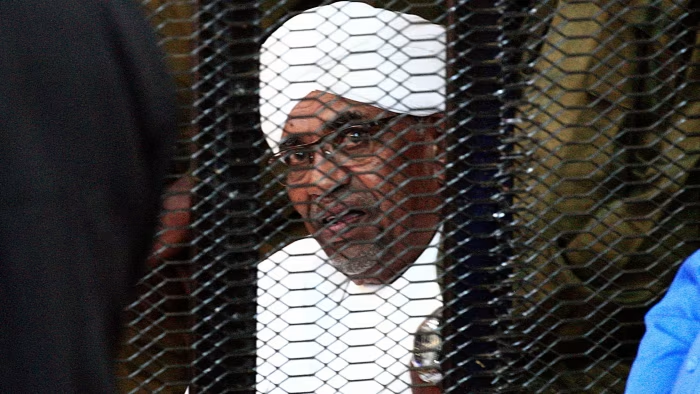
Unlock the Editor’s Digest for free
Roula Khalaf, Editor of the FT, selects her favourite stories in this weekly newsletter.
A Manhattan jury has found BNP Paribas liable for more than $20mn in damages to three Sudanese refugees after a trial over its role in banking the war-torn African nation’s ruling regime, in a case that could set the stage for far larger claims against it.
Lawyers for the refugees accused BNP Paribas of enabling human rights abuses, in a rare case of a global bank facing a jury trial for such allegations. It emerged from the French bank’s own 2014 guilty plea to criminal charges of processing blacklisted funds from Sudan and other sanctioned countries through the US financial system, for which it paid a $9bn penalty.
The refugees alleged BNP played a direct role in an “organised campaign of destruction” by Sudan’s former ruler, the dictator Omar al-Bashir, in the late 1990s and 2000s. They accused the bank of supporting Bashir’s government by giving it access to US financial markets and “petrodollars”, enabling it to buy weapons that it used against its populace as a result of oil revenue.
“The bank provided a blank cheque to the regime, which it used to perpetrate a reign of death and destruction on that targeted population,” said Michael Hausfeld, a lawyer for the refugees. “The bank knew of the genocidal use and chose to turn a blind eye of indifference to that human consequence.”
The bank was on Friday found liable of damages worth $7.3mn, $6.7mn and $6.75mn, to each of the three respective plaintiffs. But the initial case sets the stage for a series of future trials over allegations of forced displacement and human rights violations, including torture and rape.
The so-called bellwether verdict could open the door to potentially far more damages, as thousands of additional victims line up to assert claims. More than 20,000 Sudanese refugees were members of the class of victims certified in the case, according to Hausfeld, one of the law firms that represented them.
Pressure on BNP to settle the case would rise “for amounts much higher than we’ve estimated”, said Elliott Stein, a litigation risk analyst at Bloomberg Intelligence. “We don’t rule out a settlement in the low billions.”
BNP said it “believes that this result is clearly wrong” and had strong grounds for appeal. The verdict was “based on a distortion of controlling Swiss law and ignores important evidence the bank was not permitted to introduce”, it added. BNP also said it “should not have broader application beyond this decision” and only applies to the three plaintiffs.
The verdict against France’s largest bank comes after the trial started in New York last month, almost a decade after the case was first filed.
Sudan was rocked by several civil wars during Bashir’s rule that led to millions of deaths and displacements. He was charged by the International Criminal Court in The Hague with crimes against humanity, including war crimes, murder, torture and genocide, for turning the government’s armed forces against civilians in the course of a campaign against rebel groups. He was deposed in a coup in 2019.

In recent years, digital health interventions, particularly eHealth and mobile health (mHealth) platforms, have shown promise in promoting healthy behaviors []. eHealth refers to the use of digital technologies, such as…
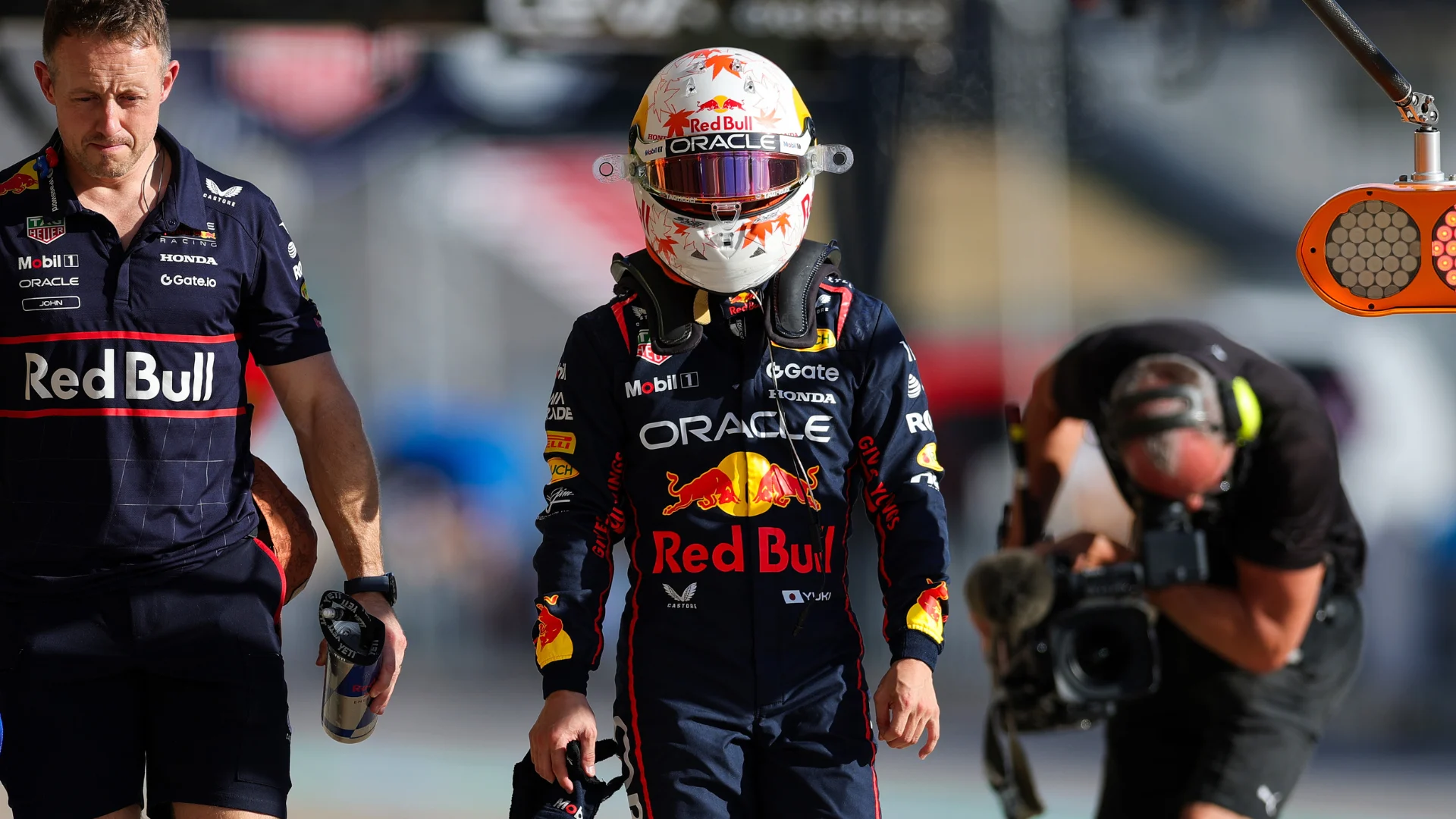
Yuki Tsunoda was left questioning what had happened after a timing error from Red Bull saw him drop out of the first phase of Sprint Qualifying at the Circuit of The Americas.
The closing moments of SQ1 saw chaos on the track, as numerous drivers…
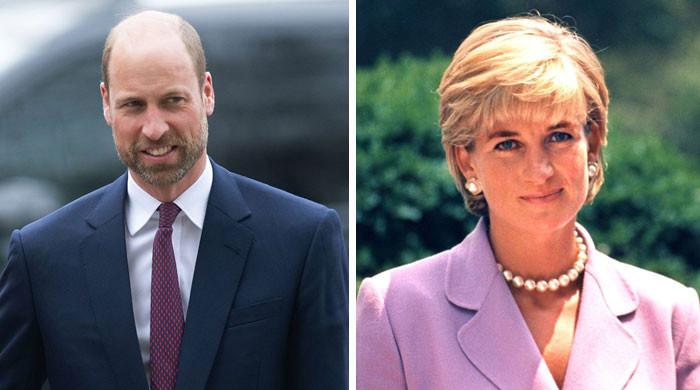
Prince William made a heartfelt promise to her mom, Princess Diana after the title of “Her Royal Highness” was taken away from her.
The Prince of Wales was…

The approval expands the use of the drug, Tezspire, as an add-on maintenance treatment of inadequately controlled chronic rhinosinusitis with nasal polyps in adult and pediatric patients aged 12 years and older.
Sign up here.
The condition causes the sinuses to stay inflamed for 12 weeks or more and soft, noncancerous growths called polyps to form in the nose. Symptoms include facial pain, reduced sense of smell and nasal congestion.
Tezspire is already approved as a single-use pre-filled syringe in the U.S., EU and other countries for add-on maintenance treatment for severe asthma.
The approval is based on the results from a late-stage study in which the drug showed clinically meaningful reduction in the size of nasal polyps and reduced nasal congestion compared to placebo.
Tezspire also reduced the number of patients needing surgery for nasal polyps by 98% and reduced the need for oral steroids by 88%, the data showed.
Tezspire, chemically known as tezepelumab-ekko, is a monoclonal antibody that blocks TSLP — a key protein involved in triggering and sustaining inflammation linked to severe asthma and related conditions.
The approval “shows the versatility of TSLP inhibition beyond asthma and highlights both companies’ commitment to take a really important scientific insight and way to treat patients into broad application that can make a real difference for patients,” said Kate Chevlen, global commercial head of inflammation portfolio at Amgen.
Reporting by Siddhi Mahatole and Sneha S K in Bengaluru; Editing by Sahal Muhammed and Shreya Biswas
Our Standards: The Thomson Reuters Trust Principles.
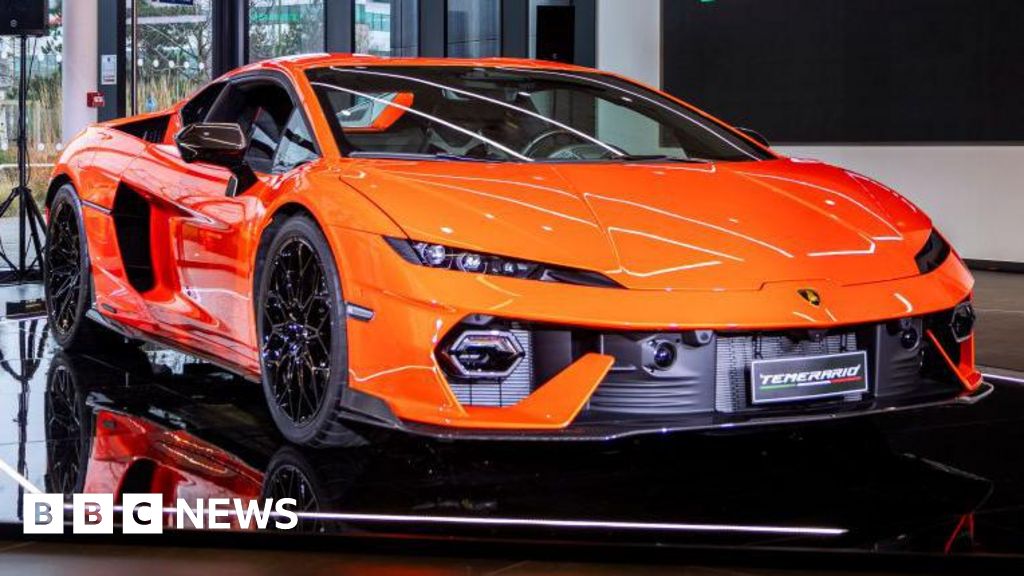
Theo LeggettInternational Business Correspondent
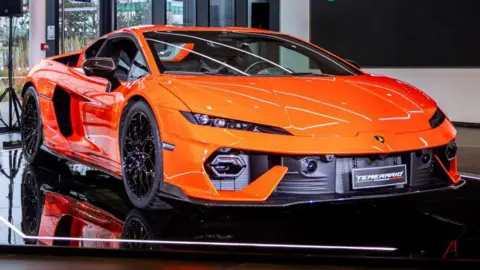 Getty
GettyThe boss of Lamborghini has said its customers still want “the sound and the emotion” of internal combustion engines, and the company will use them in its cars for at least the next decade.
Speaking to the BBC at the Italian supercar-maker’s London showroom, chief executive Stephan Winkelmann said enthusiasm for electric cars was declining – creating an opportunity to focus on hybrid power instead.
Lamborghini will decide in the next month whether a long-planned new model, the Lanzador, will be all-electric, or merely a plug-in hybrid, he said.
Mr Winkelmann insisted the business was socially responsible, but added that as a low-volume manufacturer, its actions would have a limited impact on the environment.
Lamborghini is a luxury brand ultimately owned by the Volkswagen Group. It currently has three main models.
The Temerario and Revuelto are supercars. Both are plug-in hybrids, combining powerful petrol engines with electric motors. They can run in all-electric mode, but only for very short distances.
The Urus is a luxury SUV, currently available as a plug-in hybrid and as a conventional petrol-powered car. Less exotic and certainly less ostentatious than the supercars, it nevertheless makes up more than half of the company’s sales.
There is also a limited edition ‘super-sports’ car: the Fenomeno, which has a top speed of more than 215mph. Only 30 will be built, each costing at least €3m (£2.6m) before taxes.
Two years ago, Lamborghini announced plans for an all-electric successor to the Urus, which would have been available from 2029. However, the plan was recently shelved, with the electric model now not expected before 2035.
It had also planned to make a brand new battery-powered grand tourer (GT), to be called the Lanzador. However, the future of that project is also deeply uncertain.
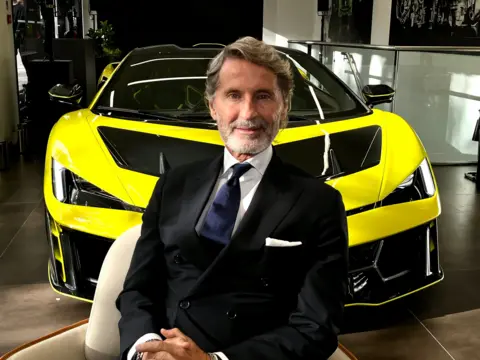
“We still need to decide whether we are going full electric, the decision we took some years ago, or seeing whether in the new environment this should also be a plug-in hybrid”, said Mr Winkelmann.
The new environment he referred to is a perceived waning of interest in electric cars among high-end buyers.
“Today enthusiasm for electric cars is going down”, he explained. “We see a huge opportunity to stay with internal combustion engines and a battery system much longer than expected”.
Continuing to use internal combustion engines for another 10 years, he said, would be “paramount for the success of the company”. Customers, he insisted, still hankered after the noise and fury of a conventional motor.
“This is something they want, they still want the sound and the emotion of an internal combustion engine”, he said.
It’s an approach that contrasts with that of Lamborghini’s Italian arch-rival Ferrari, which is pushing ahead with its own plans for a first all-electric car.
The aptly-named Elettrica is due to be unveiled next year, though the company showed off some key components at its Capital Markets Day earlier this month.
It will be sold alongside conventional and hybrid models.
Ferrari chief executive Benedetto Vigna said it would have driving traits that were “unique in the heart, in the soul of our clients.”
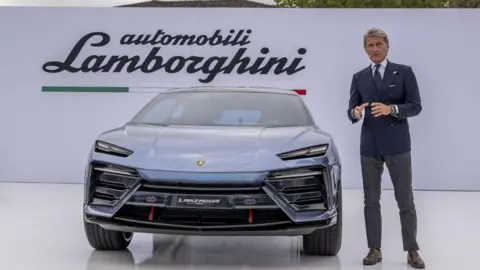 Getty Images
Getty ImagesMr Winkelmann insisted his own company was not ignoring the ongoing pressure to cut emissions.
“We are selling 10,000 cars in a world that is producing 80 million cars a year, so our impact in terms of CO2 emissions is not that important”, he said.
“For sure, we are socially responsible, but it doesn’t really make a lot of difference”.
The sale of new petrol and diesel cars, including plug-in hybrids, is due to be banned in both the the EU and the UK from 2035.
However, in the EU, there has been intense lobbying from some manufacturers for the transition to electric cars to be given more time, in order to “acknowledge current industrial and geopolitical realities”.
If that happens, internal combustion engines could remain on the market beyond the current deadline.
Meanwhile the UK’s rules provide an exemption for “low volume” manufacturers who register fewer than 2,500 new cars each year.
This would currently cover Lamborghini, which sold just 795 cars here last year.